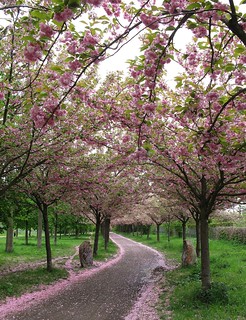Under A Cherry Tree, There Are No Strangers
8 Sep 2013
"Under a cherry tree, there are no strangers" is a quote by the Japanese poet
Kobayashi Issa. The quote reminded me of get togethers at a friend's place where friendships blossom. I see five to six new faces every time. My heartfelt thanks to them for bringing people together and entertaining them.
The significance of cherry blossoms in Japanese culture is captured very well by a passage at Bon Appetit's Blog:
“As spring breaks in Japan, the sakura, or cherry blossom trees, begin to burst into a cotton candy tableau. The petals usually hold fast to their branches for only a matter of days — a national symbol of how fleeting life and beauty can be, embraced by everybody from schoolgirls to yakuza (crime syndicates). Most Japanese take advantage of this small window for their first picnic of the year, drinking and cavorting with friends and co-workers under the blossoms before they flutter to the ground in a surreal pink snowfall. Even in Japan’s severe salaryman culture, couples, cliques, and entire companies skip work to congregate under the nearest sakura trunk to drink, sing, and eat delicious food, usually made by someone in attendance.”

Cherry trees along the former course of the Berlin Wall.
What's the relationship between cherry trees and the Berlin Wall? The caption of a Flickr Photo explains:
“9,000 cherry trees were donated by the Japanese people to Germany, as a sign of jubilation about the fall of the Berlin Wall. Planted in 1993, these trees now form cherry avenues along the former course of the Wall, and are is a pure joy to ride along in May. Sakura, Berlin style!
If anything good has come out from the Wall, it is this 160k bike trail / walking path that took the place of the Wall that encircled the "island" of West Berlin from 1961 to 1989, dividing it from East Berlin and the East German state that surrounds Berlin.”


